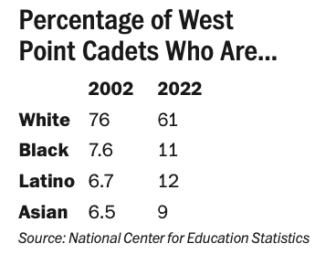Group recruiting rejected applicants for lawsuit
West Point’s growth in minority enrollment could face a new threat.
Students for Fair Admission, an organization that in June won a U.S. Supreme Court case that effectively ended the consideration of race in admissions decisions by universities, is recruiting plaintiffs for a lawsuit against West Point and the Air Force and Naval academies.
The group says it is “committed to ending these practices at America’s military service academies.” Applicants to the academies and high school seniors intending to apply are invited to “tell us your story” at WestPointNotFair.org if they suspect they didn’t get in because “you’re the wrong race.”
Students for Fair Admission claimed discrimination against Asian and white applicants in lawsuits against Harvard and the University of North Carolina that ended up before the Supreme Court. On June 29, in a majority opinion written by Chief Justice John Roberts, the court said the schools “lack sufficiently focused and measurable objectives warranting the use of race, unavoidably employ race in a negative manner, involve racial stereotyping and lack meaningful endpoints,” in violation of the Equal Protection Clause of the U.S. Constitution’s 14th Amendment.
Roberts also concluded, however, that “nothing prohibits universities from considering an applicant’s discussion of how race affected the applicant’s life, so long as that discussion is concretely tied to a quality of character or unique ability that the particular applicant can contribute to the university.”
The opinion does not address the consideration of race in admissions to West Point and the other military academies “in light of the potentially distinct interests that military academies may present,” Roberts wrote.
 Minority enrollment has grown significantly at West Point, where applicants need to meet academic and physical-fitness requirements and be nominated by the U.S. president or vice president, a member of the U.S. Senate or House, Army veteran or the children of military members who are deceased, disabled, a Medal of Honor recipient, a prisoner of war or missing in action.
Minority enrollment has grown significantly at West Point, where applicants need to meet academic and physical-fitness requirements and be nominated by the U.S. president or vice president, a member of the U.S. Senate or House, Army veteran or the children of military members who are deceased, disabled, a Medal of Honor recipient, a prisoner of war or missing in action.
Minorities represent 38 percent of West Point’s incoming first-year class this year, including 170 Asians, 137 Latinos, 127 Blacks and 18 Native Americans, according to the academy.
That diversity drew support from a group of 35 former military leaders who filed an amicus brief in the Supreme Court case. The group includes Daniel Christman, a former West Point superintendent, and Bob Kerrey, a former Nebraska senator and governor.
They argue that the military’s ability to field a diverse corps of officers “hinges, in turn, on the military’s continuing admission of diverse student bodies” to the academies and Reserve Officer Training Corps programs at colleges.
“History has shown that placing a diverse armed forces under the command of homogenous leadership is a recipe for internal resentment, discord and violence,” they wrote. “By contrast, units that are diverse across all levels are more cohesive, collaborative and effective.”
The military leaders criticized as “thinly sourced” an amicus brief filed by a group called Veterans for Fairness and Merit, which says 292 of its 627 members are graduates of the five service academies (including the Coast Guard and Merchant Marines).
Veterans for Fairness and Merit claims that considering race in admissions is “unquestionably harmful to our national security” and that the policies “have been costly, inefficient, and, in some instances, have reduced quality.”


In its pursuit of an ideological victory, Students for Fair Admission is missing the myriad differences between service academies and other universities.
When you apply to a military academy, you are being interviewed for a job. Once accepted, you are paid a salary, receive health benefits and follow all the rules governing military life throughout your academic career. Further, employment is guaranteed for five years upon graduation. You are attending a university but, make no mistake, you are in the military.
Beyond that, military academy admission is a completely closed system of quotas and required references, anyway. To cite one example not mentioned in the article: Each state has a fixed number of slots to allocate to applicants from that state. If the Students for Fair Admission lawsuit is successful, shouldn’t residents of states with relatively small populations, such as Rhode Island, Delaware, Idaho or Wyoming, file a lawsuit because too many Texans have been admitted?
It appears that Chief Justice John Roberts understands this. If this case reaches the Supreme Court, I hope reason prevails with its more ideological members.